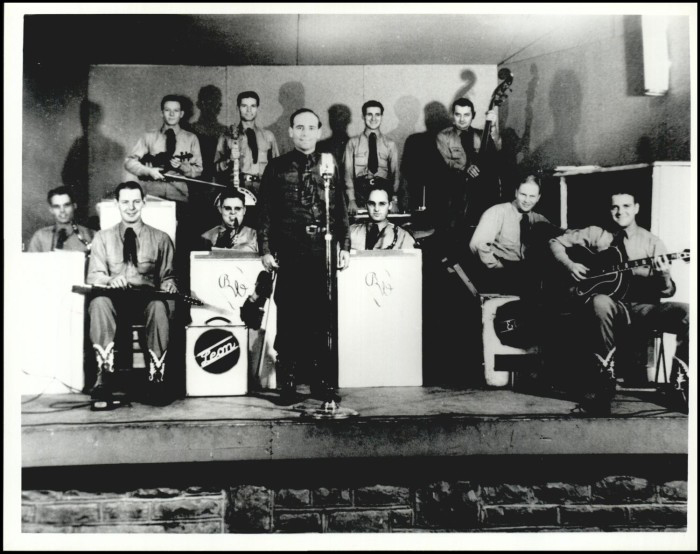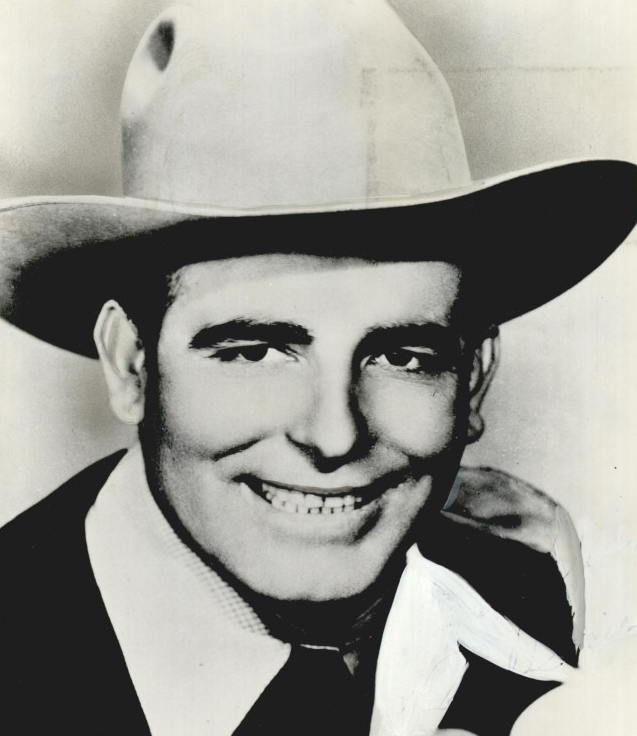The Encyclopedia of Oklahoma History and Culture
WILLS, JAMES ROBERT (1905–1975).
Famed as "the King of Western Swing" James Robert (Jim Rob) "Bob" Wills was born on March 6, 1905, in Limestone County, Texas, into a family of musicians. His parents were John and Emma Wills. As a youngster, when he played the fiddle, Wills was forced to use all of the bow (not just the upper end as breakdown fiddlers do) and he developed a long bow technique. By 1913 the family was in West Texas, and young Wills and his father played at dances. In his young adult years he knocked around that region, working at various jobs.
In 1929 Wills moved to Fort Worth and performed in a blackface minstrel show. He was joined by Herman Arnspiger, a guitarist. While playing at house dances in Fort Worth, Milton Brown, a cigar salesman and singer, also worked with them. These three became the core of the original Light Crust Doughboys, which broadcasted over KFJZ for Burrus Mill and Elevator Company. In 1932 Tommy Duncan replaced Brown when he left the group.
In September 1933 Wills quit the Doughboys and took his own band to Waco, Texas. He persuaded Duncan, his brother Johnnie Lee Wills, and two brothers, Kermit and June Whalin, also to leave Fort Worth. While broadcasting over WACO, Everett Stover, a trumpet player, started playing with them, and O. W. Mayo became the band's manager. However, W. Lee O'Daniel, who fronted the Light Crust Doughboys and was the Burrus Mills manager, initiated an unsuccessful lawsuit that claimed damages because Wills advertised his band as "formerly the Lightcrust Doughboys." In January 1934 Wills decided to relocate and moved to Oklahoma City and WKY radio. O'Daniel again harassed the band, promising WKY that he would buy air time if they would cancel Wills's show, which the radio station did.
Wills and Mayo decided to try Tulsa and KVOO, a 25,000-watt radio station. At midnight on February 9, 1934, they played a one-hour trial broadcast and were given a daily show. When O'Daniel tried to buy KVOO time, the station declined to cancel Wills's broadcast. KVOO and Tulsa became the voice of Western swing. Wills began to use the name Texas Playboys after they moved to Tulsa. Bob Wills, Johnnie Lee Wills, Tommy Duncan, June and Kermit Whalin, Everett Stover, Son Lansford, and O. W. Mayo composed the original Texas Playboy lineup.
In 1935 they made Tulsa's Cain's Ballroom their headquarters for the broadcast of their noonday show, Monday through Saturday, and their Thursday and Saturday night dances. The band added horns, and by 1940 the Playboy organization had grown to a size comparable to any big swing band in the nation. With a repertoire of more than three thousand songs, Bob Wills and His Texas Playboys became legends.
In 1940 Wills and a few band members made a movie with Tex Ritter titled Take Me Back to Oklahoma. In July 1942 Wills turned over all Tulsa activities to Johnnie Lee Wills, relocated the Texas Playboys to California, and appeared in many more films. World War II broke apart the Playboys organization, and when Bob Wills reorganized, he primarily used stringed instruments. In 1948 he fired Tommy Duncan, and neither again enjoyed the success of former years. As the big-band era faded, Wills reduced the size of the ensemble. He moved his headquarters from Sacramento to Oklahoma City and finally to Texas but never regained the prosperity that he had possessed in Tulsa.
In 1958 Bob Wills took over Johnnie Lee Wills's band in Tulsa and toured the Southwest. In 1960 he briefly reunited with Duncan for recordings and a few personal appearances. Wills soon returned to using local bands for his appearances. Because he hired so many local groups over the decade, numerous musicians have claimed to have worked with him. Bob Wills died on May 13, 1975, and was buried in Tulsa beside his parents and siblings. Wills and the Texas Playboys band members made numerous recordings in more than fifty years in the music industry, including classics such as "Take Me Back to Tulsa," "Faded Love," and "San Antonio Rose."
See Also
Bibliography
Guy Logsdon, Mary Rogers, and William Jacobson, Saddle Serenaders (Salt Lake City, Utah: Gibbs Smith Publisher, 1995).
Charles R. Townsend, San Antonio Rose: The Life and Music of Bob Wills (Urbana: University of Illinois Press, 1976).
Rosetta Wills, The King of Western Swing: Bob Wills Remembered (New York: Billboard Books, 1998).
Citation
The following (as per The Chicago Manual of Style, 17th edition) is the preferred citation for articles:
Guy Logsdon, “Wills, James Robert,” The Encyclopedia of Oklahoma History and Culture, https://www.okhistory.org/publications/enc/entry?entry=WI020.
Published January 15, 2010
© Oklahoma Historical Society



